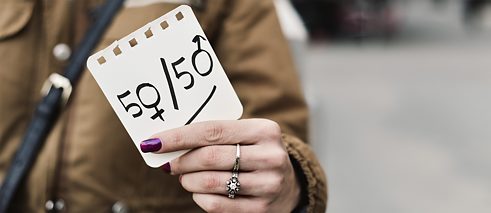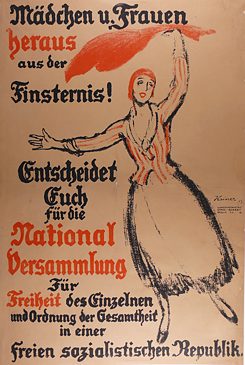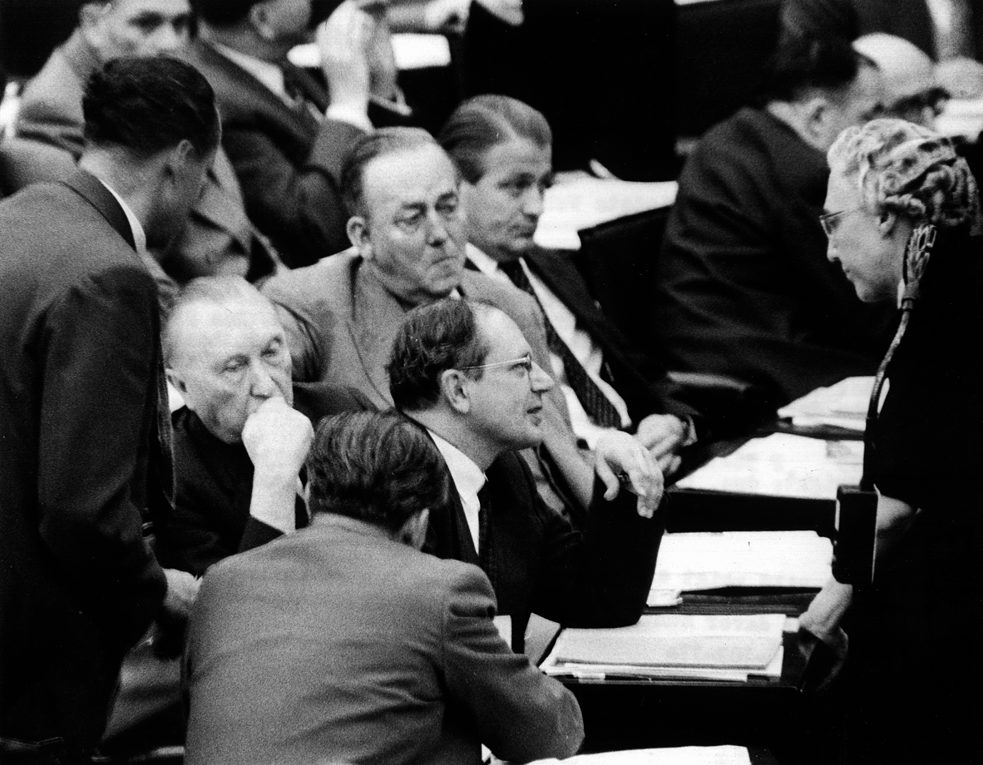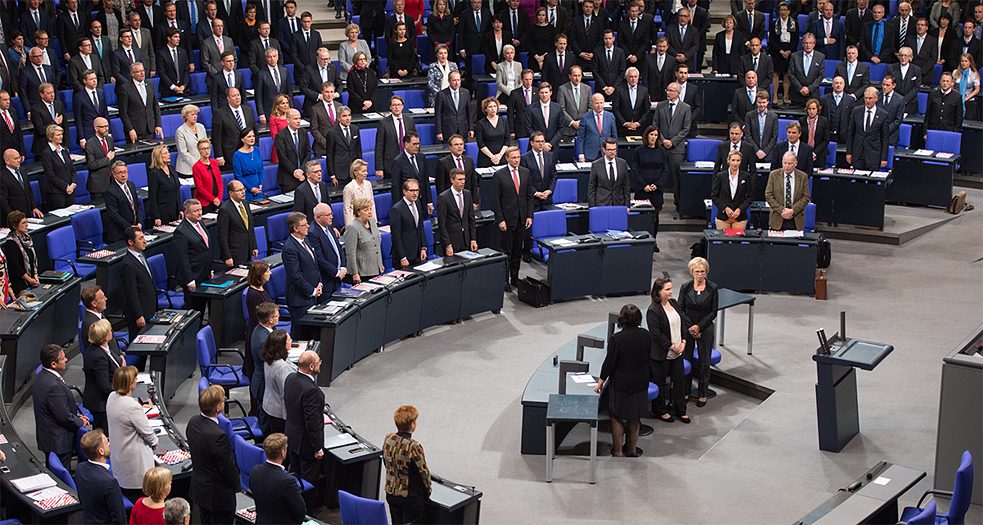Women’s Suffrage
Two steps forward, one step back

Germany is celebrating 100 years of women’s suffrage, but political power is still unevenly distributed. In terms of numbers, women have never been equally represented in any German Bundestag. Initiatives like the Helene Weber Kolleg are pushing for change.
You can almost feel the pressure; sense the crushing, constricting force: two snow-white corsets with stiff, whalebone stays and small, unyielding hooks and eyelets are the very first thing to confront visitors to the “Damenwahl!” (Women’s Suffrage!) exhibition. The metaphor is deliberate. “Corsets were still severely confining women at the beginning of the last century, restricting their freedom of movement,” historian Dorothee Linnemann, who curated and compiled the exhibition at the Historisches Museum Frankfurt, says. The show opened at the end of August 2018 and is the centrepiece of the “100 Jahre Frauenwahlrecht” (100 Years of Women’s Suffrage) centenary celebration. In 900 square meters the 450 items on display detail the history of the early German suffragettes, following their story right up to January 19, 1919 – the first day women were allowed to vote and be elected to public office in Germany. It continues with an overview of the post-1945 democratic reboot when equality between men and women was officially anchored in the Federal Republic of Germany’s new constitution.
“We are backsliding at the moment”
 A 1919 campaign poster calls on women to come “out of the darkness” and vote.
| Photo: © Historisches Museum Frankfurt
Berlin-based political scientist Helga Lukoschat, Chair of the Board of the Europäische Akademie für Frauen in Politik und Wirtschaft Berlin e.V. (EAF, the European Academy for Women in Politics and Business Berlin), feels the exhibition is highly topical and relevant. “While women are obviously no longer the exception in politics,” she says, “they are still far from the rule. To this day, no parliament in Germany has ever shown equal representation, i.e. an even balance between women and men – despite the fact that it has been 100 years since 1919.”
A 1919 campaign poster calls on women to come “out of the darkness” and vote.
| Photo: © Historisches Museum Frankfurt
Berlin-based political scientist Helga Lukoschat, Chair of the Board of the Europäische Akademie für Frauen in Politik und Wirtschaft Berlin e.V. (EAF, the European Academy for Women in Politics and Business Berlin), feels the exhibition is highly topical and relevant. “While women are obviously no longer the exception in politics,” she says, “they are still far from the rule. To this day, no parliament in Germany has ever shown equal representation, i.e. an even balance between women and men – despite the fact that it has been 100 years since 1919.”
At the local level, only about a quarter of all politicians are women, Lukoschat adds, and women hold just ten percent of all mayoral positions. In the German Bundestag, 30.9 percent of all members are women – the same number as 19 years ago and seven percentage points lower than the previous legislative period. “So we are not just seeing stagnation; we are witnessing a backslide.”
Local politician Rosemarie Heilig, Frankfurt's Department Head for Women and the Environment, concurs. From 2006 to 2011, the city along the River Main had a female mayor, deputy mayor and head of city council. “Today though, the proportion of women in our city council has fallen by ten percent.”
Strengthening local female politicians
In 2011, the EAF Berlin founded the Helene Weber Kolleg (HWK) under the aegis of Helga Lukoschat and with the support of the Federal Ministry of Family Affairs to support women in entering local politics. The initiative was named after Helene Weber, a women's rights activist and politician and one of the first 37 women to be voted into the German Bundestag in 1919. Thirty years and one world war later, Weber served as a member of the Parliamentary Council and, together with fellow activists Frieda Nadig, Elisabeth Selbert and Helene Wessel, campaigned for equal rights to be enshrined in the German constitution. “These four women are considered the 'mothers of the German constitution’,” Lukoschat explains. “They had to fight and mobilise to ensure that equal rights were anchored in the constitution. But this merely created the legal basis for equality; in the real world, it was still a very long way off.”
 In 1956 CDU MP Helene Weber debates the national service law with German Chancellor Konrad Adenauer and other MPs in the German Bundestag.
| Photo: © picture-alliance / dpa
That fight for inclusion continues to this day, Lukoschat says, whether women are aiming for a leading role in business or for a top slot on a party ballot. The HWK organises mentoring programmes and seminars for young female politicians, training them in assertiveness and sharpening their PR skills so they can better handle the press, competitors and critics. “We teach them how to build alliances.” This is something the suffragettes involved in the First German Women's Movement 100 years ago modelled exceptionally well. The activist pioneers were extensively networked, and collaborated and exchanged ideas across party, religious and national lines.
In 1956 CDU MP Helene Weber debates the national service law with German Chancellor Konrad Adenauer and other MPs in the German Bundestag.
| Photo: © picture-alliance / dpa
That fight for inclusion continues to this day, Lukoschat says, whether women are aiming for a leading role in business or for a top slot on a party ballot. The HWK organises mentoring programmes and seminars for young female politicians, training them in assertiveness and sharpening their PR skills so they can better handle the press, competitors and critics. “We teach them how to build alliances.” This is something the suffragettes involved in the First German Women's Movement 100 years ago modelled exceptionally well. The activist pioneers were extensively networked, and collaborated and exchanged ideas across party, religious and national lines.
Networking for more womanpower
The Kolleg is just one of the national and international initiatives dedicated to supporting women and driving equality forward. Women’s rights groups joined in the me-too debate, and continue to advocate for fair pay and better work-family balance. The Female Future Force, for example, founded by Edition F editors Nora-Vanessa Wohlert and Susann Hoffmann, sees itself as a movement “for female empowerment”. The last Female Future Force Day networking event attracted 4,000 visitors. In Belgium, the “Brussels Binder” women’s initiative has set up an online database of female political experts and journalists. According to BB spokeswomen Scarlett Varga and Juliane Schmidt, the aim is to counteract the “mysterious” absence of women in the Brussels political landscape.
“I am confident that the coming generation will keep the women’s movement alive and add to the agenda,” Lukoschat says. With the EAF, she is currently campaigning for a parity law that would set something akin to a quota for women in politics. And so it would seem Marie Juchacz, another of the women parliamentarians elected in 1919, was something of a profit when she said 100 years ago: “The right to vote alone,” as is emblazoned along with a large portrait on a flag at the Frankfurt exhibition, “will not set women free.”
 While female MPs have long been an integral part of the German Bundestag, they are still underrepresented.
| Photo: © picture alliance / Anngret Hilse / SvenSimon
While female MPs have long been an integral part of the German Bundestag, they are still underrepresented.
| Photo: © picture alliance / Anngret Hilse / SvenSimon